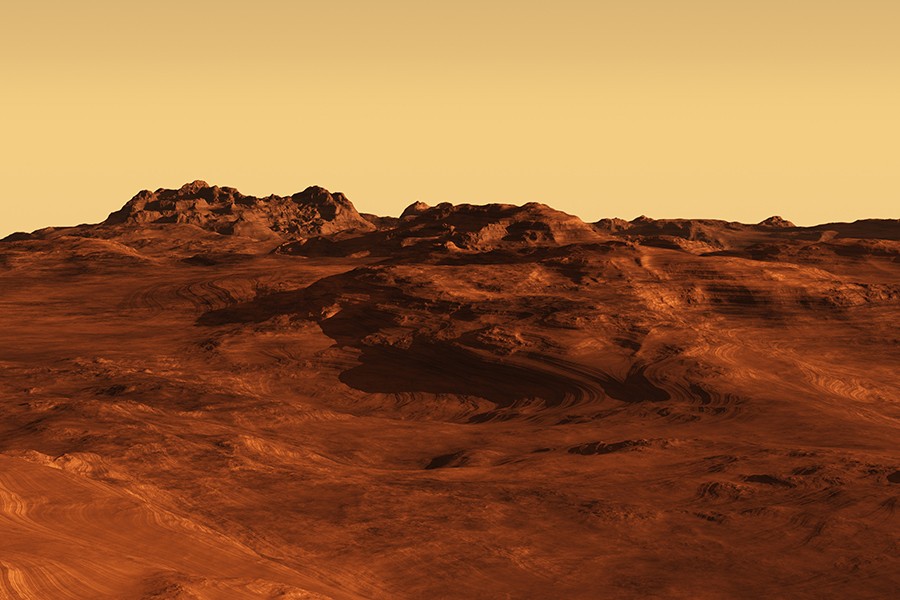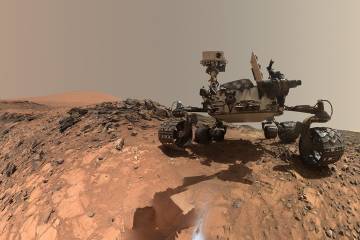Mars is not red—it's blushing from humanity's profusion of attention. At present, a small fleet of robotic spacecraft and vehicles probe the planet, among them a car-sized rover called Curiosity that roams the Gale crater to send back dazzling images and oodles of scientific data. And then there's the MAVEN spacecraft, which orbits the planet to survey the atmosphere. In 2016, NASA will launch InSight to study the planet's deep interior. More missions are on tap in 2020 and beyond, paving the way for possible future human exploration.
Mars has long inspired authors to tell tales, from the benign (My Favorite Martian) to the heroic (DC Comics' Martian Manhunter) to the ridiculous (Mars Attacks!). And there's more to come. Mars will provide the backdrop for the upcoming Ridley Scott film The Martian about an astronaut (Matt Damon) stranded on the planet.
Being curious about all things Red Planet, we turned to Kevin Lewis, an assistant professor in Earth and Planetary Sciences and a participating scientist with NASA's current Curiosity mission. Lewis works with images and topography of sedimentary rocks to evaluate the Martian landscape and geological features, all in an effort to determine the planet's past climate.
Can you explain the appeal of Mars to writers who dream up scenarios of colonization and signs of life?
Mars is a dynamic place. It's almost like visiting Egypt's pyramids. We know amazing things happened here once. But where did all the water go, and why is it now a dead planet? It's the only other planet in our solar system that had liquid water on its surface, yet something went wrong along the way that made the planet diverge pretty strongly from the Earth. There's a bit of mystery novel to the planet. It's also very similar to what we're used to. Maybe Mars was not Miami Beach, but it probably felt a lot more like home at some point in its history. It's also, relatively speaking, easy to get to. So while we're homing in on other Earth-like planets in our universe that may harbor evidence of life, we're not getting to those anytime soon. Mars is within our reach.
What are Curiosity's most significant findings to date?
One of the really amazing discoveries came just after we landed. The first sample of rocks we took showed us these perfectly rounded pebbles. It's pretty clear they were formed by ancient rivers. We've known for some time—from pictures taken from orbit—that Mars had what looked like river networks, but this is the first time we saw basically a preserved stream bed like one you'd find on Earth. We've also found fine-grained sediments, very likely evidence of lake beds. All this has helped us feel more secure that there was standing water on the surface during a more habitable period in the planet's history.
What are the prevailing notions on past climates?
Current atmospheric pressures [thin, mostly carbon dioxide] and temperatures [average -81 F] don't support standing water. There are some challenges to getting Mars to be warm and stay warm over geological time. Clearly the planet had a radically different atmosphere and climate than it has today. Very possibly there was liquid water on the surface for just a blip of time, but how long? And what volume? These are some of the questions we're looking to answer and that will help us learn more about the climate conditions necessary.
But what of "Martians," or any form of life there?
First, consider that macroscopic life became dominant just in the past 10 percent of Earth's history—and after that period of climate transition that happened on Mars. So it's totally plausible we had some early biological activity on Mars, but almost certainly it would have been on the microbial level, like bacteria. Don't expect fossilized bird bones, tree trunks, or Martian skeletons. But it's important to keep in mind that deep surface exploration is not possible with this mission. There might be more signs of life buried deep away that we can't currently get to.
Clearly NASA is invested in exploring Mars, but what of possible manned missions?
A dedicated program needs to be in place, one that will require an effort on an international scale. It would be a big project, but potentially hugely scientifically rewarding and totally inspiring for humanity. A project of this size and scope is not currently feasible given the NASA budget, but we can start to lay the groundwork for the technology needed. [Note Dec. 5 Orion launch.] We need a rocket big enough to get us and our instruments there, with a return rocket, like we did on the moon. And then we have to protect the astronauts once they're on the surface, thus the need for more information about the current Mars conditions.
Posted in Science+Technology, Voices+Opinion
Tagged space, earth and planetary sciences











